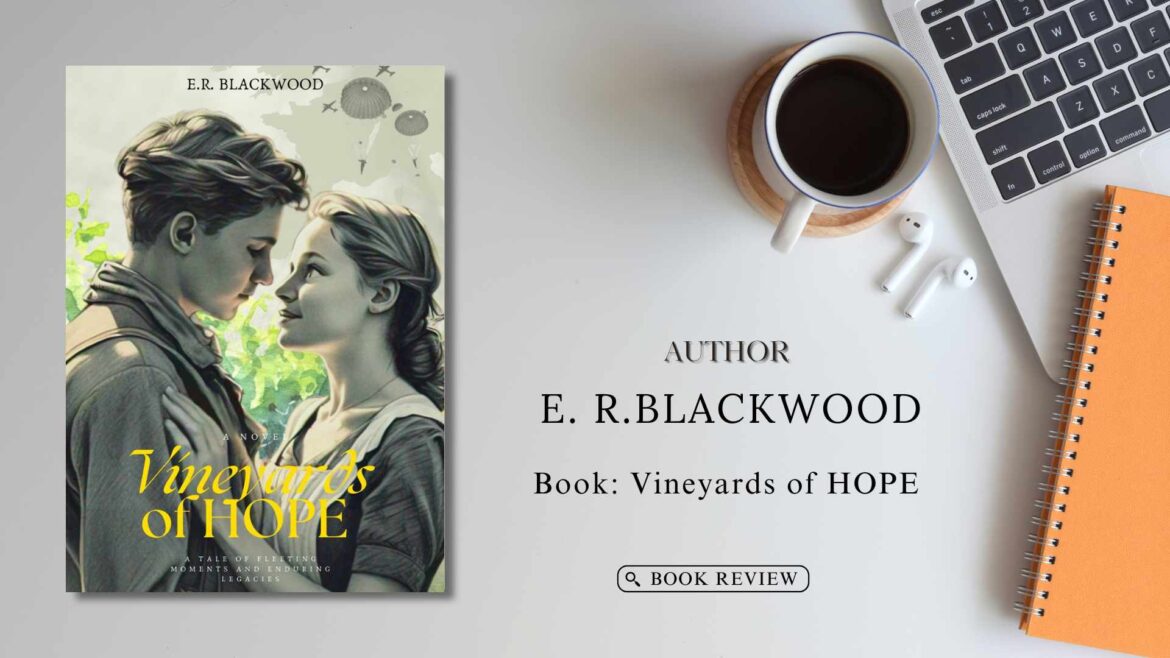Vineyards of Hope by E.R. Blackwood is a remarkable debut novel that captivates readers with its deeply emotional portrayal of love, loss, and resilience set against the tumultuous backdrop of World War II. With a compelling narrative, vivid descriptions, and richly developed characters, Blackwood crafts a story that immerses readers in the heartache and hope of those living through the darkest of times.
The novel unfolds in the occupied region of France, where the beauty of sun-drenched vineyards and the shadows of war create a poignant juxtaposition. The story revolves around two central characters: Jack Holloway, an American agent caught between duty and his growing love for a woman deeply entrenched in the resistance, and Marianne Dupont, a French woman who fights to preserve her family’s legacy while also protecting her country’s freedom. Both characters are placed in impossible situations, making choices that will shape not only their fates but the lives of everyone around them.
Jack Holloway is a complex protagonist, embodying the moral conflict that many soldiers and agents faced during World War II. As a foreign agent in occupied France, his mission is clear: help the resistance and gather intelligence. However, when he meets Marianne, a woman with her own quiet strength and determination, his sense of duty becomes tangled with his emotions. Their relationship is tender, marked by the slow burn of shared moments of vulnerability amid the chaos of war. Yet, their love is not an escape from the tragedy of their circumstances but rather a source of strength, representing the enduring spirit of hope and humanity in the midst of war.
Marianne Dupont, as a member of the French resistance, is equally compelling. She is a woman of incredible courage, dedicated to her family and her country. Her struggle to balance her personal desires and the weight of her duty is a recurring theme throughout the novel. As she fights not just for survival but for the preservation of her heritage, Marianne’s resilience becomes a symbol of the broader fight for freedom and justice during the war. Her love for Jack is deeply intertwined with her commitment to the cause, and the tension between these two forces creates a rich emotional layer to the story.
The strength of Vineyards of Hope lies not just in its characters, but in Blackwood’s ability to vividly recreate the atmosphere of occupied France. The sun-soaked vineyards, once symbols of peace and prosperity, are transformed into dangerous zones of resistance and secrecy. The contrast between the idyllic beauty of the land and the harsh realities of war lends the novel a haunting and cinematic quality, as though the story is unfolding before your eyes. Blackwood’s background in filmmaking and theatre is evident in the novel’s pacing, dramatic tension, and detailed settings, which come alive as if pulled from a historical film reel.
The emotional core of the book revolves around the concept of hope—how it sustains people in the darkest times, even when it seems futile. The characters’ struggles are not just physical but internal, as they come to terms with the weight of their decisions and the consequences of their actions. In many ways, the vineyards themselves serve as a metaphor for this hope—like vines struggling to grow amid the soil of war, love and resilience find a way to flourish even in the harshest conditions.
As Jack and Marianne’s journey unfolds, readers are invited to witness the anguish and courage of ordinary people forced to make extraordinary choices. There are moments of heartache, but also moments of pure beauty, as love and loyalty transcend the bounds of war. The author’s ability to balance the emotional highs and lows ensures that the reader is constantly invested in the outcome of the characters’ journeys.
The novel also captures the complex and multifaceted nature of wartime resistance. The resistance networks, fraught with secrecy and danger, are portrayed with authenticity and respect, showing the incredible risks that ordinary men and women took to fight against oppression. Vineyards of Hope does not shy away from depicting the horrors of war but does so in a way that honors the humanity of those involved, portraying not just their suffering but their moments of triumph and solidarity.
By the time you reach the final pages, Vineyards of Hope has cemented its place as not just a historical novel, but a deeply affecting story about the resilience of the human spirit. It is a tale about survival, about the choices that define us, and about the enduring power of love, even in the face of devastation. The book’s conclusion, while not necessarily a traditional “happy ending,” leaves readers with a sense of quiet triumph—the kind that comes from doing what is right, even when the odds seem impossible.
In conclusion, Vineyards of Hope is an emotionally powerful and richly textured novel that will appeal to fans of historical fiction, romance, and anyone looking for a story that explores the complexity of human emotions during wartime. E.R. Blackwood’s cinematic storytelling, combined with deeply relatable characters and poignant themes, makes this debut novel a standout in its genre. The book will not only entertain readers but will inspire them to reflect on the timeless values of courage, justice, and love, values that continue to resonate in our modern world. Highly recommended for those who enjoy books that combine history with heart, Vineyards of Hope is a story that lingers long after the final page is turned.



